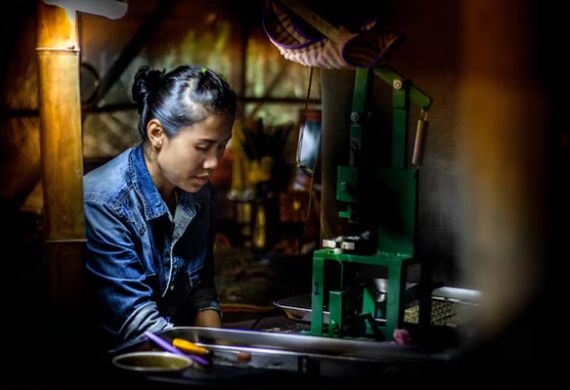
Maharashtra Unveils Draft Rules to Safeguard Women Working Night Shifts in Factories
By: WE staff | Monday, 28 July 2025
- Maharashtra prepares safety guidelines for night-shift women, in sync with central and state labour legislation
- Signed consent from women employees is compulsory for working on night shifts in
- The program seeks to foster safe and equitable work climates for women in industrial occupations
The Maharashtra government has come out with a draft of new safety guidelines to safeguard women employees working night shifts in factories as per labour codes laid down by the central and the state governments.
The draft rules mandate the factory to seek written approval from women workers prior to placing them on night shifts. Furthermore, factories have to offer transport facility for pick-up and drop, assign at least two women staff members to duty on night shifts, and adopt practical safety precautions to protect women workers.
Though the night shifts were opened to women already in 2015, this is the first time specific safety measures are being enforced officially by the government. The draft, released on July 24, is available for public comments and objections for the next 45 days.
Rule 102B amendments provide that factory premises, toilets, corridors, and exits should be well illuminated, and CCTV monitoring with a backup recording for 45 days is mandatory. The women should also be provided a 'Grievance Day'—an opportunity to meet with management with the help of representatives once in eight weeks.
Amendments to Rule 114A are concerned with women engaged in dangerous environments. Factories are required to supply protection equipment like respirators, nose masks, head caps, aprons, and overcoats. Pregnant and lactating women cannot be engaged in dangerous work that subjects them to carcinogenic or teratogenic chemicals. All women employees are required to be trained concerning the dangers of their workplace and chemicals handled.
Though these changes bolster women's protection, the government has also relaxed some overall worker protection requirements, eliciting scrutiny. Rule 73W revisions now increase the threshold for needing occupational health centres from 50 to 150 workers, diminishing the accessibility of healthcare for smaller factory units. Likewise, health centre facilities and medical officer services those were earlier obligatory for factories employing 51 to 500 employees will now be applicable only to those with 151 to 1,000 employees.
Furthermore, the government has done away with the obligatory provision for canteens, earlier obligatory in factories with over 250 employees, by abolishing Rule 79. This implies that no factory is now compulsory to have a canteen on the premises.
Most Viewed
- 1 Women's Health Startup HerMD Closing Doors Amid Industry Challenges
- 2 5 Famous Women in Indian Armed Forces
- 3 Saudi Women No longer Require Male Permission for Clothing Choices, says Prince MbS
- 4 Kolkata Medtech Startup Innovodigm Raises Rs 5.5 Crore Seed Funding Led by IAN Group
- 5 Yamunanagar's Kashish Kalra Honoured after Securing 111th Rank in UPSC Civil Services Exam
- 6 Madurai Appoints Its First Woman Corporation Head
- 7 IAS Vijayalakshmi Bidari Appointed as the new Nagpur Divisional Commissioner
- 8 American Entrepreneur Lucy Guo Overtakes T Swift to become Youngest Female Billionaire
- 9 ICC Women's World Cup 2025 Trophy Showcased at Indore's Holkar Stadium
- 10 Aparna Saxena's Beauty Venture AntiNorm Launches in India
- 11 Vidya Nataraj Co-Founded BlueStone Jewellery & Lifestyle files IPO
- 12 5 Women Freedom Fighters of India
- 13 Dr. G Krishnapriya appointed as CEO for Trichy
- 14 M3M & Sirona Partner to Introduce Menstrual Hygiene Vending Machines in 15 Locations
- 15 Punjab Govt launches SHE Cohort 3.0 Supporting Tech-led Women Startups
- 16 Indian origin Lawyer, Sweena Pannu appointed as the US New Superior Court Judge
- 17 The Aurora Tech Award recognizes 4 Indian Women-led Startups
- 18 Kerala's Republic Day parade featured an all-female tableau
- 19 Manisha Kabbur Becomes Karnataka's First Woman International Karate Coach
- 20 Director K. S. Ravikumar's Daughter Maalica Ravikumar Launches Life Coaching Company 'Evergrowth Academy' for Women
- 21 Leezu's Raises Pre-Seed Funding to Accelerate Growth in Sexual Wellness Industry
- 22 Sattu: Super-easy summer drink for PCOS gut healing
- 23 Swathi Nelabhatla creates Sitha App, India's First Women-Exclusive Gig Platform
- 24 7 Timeless Female Kathak Dancers & their Iconic Legacies
- 25 Meet 7 Iconic Women Architects of Modern India & their Most Impactful Work
- 26 This Woman-led Insuretech Startup is Helping Bridge the Education Financing Gap in India
- 27 Women Leaders Share Lessons Learnt from India Women's WC Win
- 28 5 Enterprising Women Founders Powering Singapore's Tech & Innovation Landscape
- 29 4 Women. 4 Stories. One Vision for Smarter, Stronger Healthcare
- 30 Global Gender Gap Narrows to 68.8%, But Full Equality 123 Years Away: WEF Report 2025
- 31 Changemakers: 7 Women Entrepreneurs Taking the Make in India Movement Forward
- 32 Meet Lucy Guo, The Youngest Self-Made Female Billionaire Disrupting Tech
- 33 How Women are Driving India's Festive Online Shopping Surge






